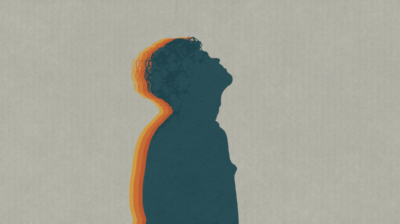Why it’s so important to talk about mental health
Clara shares her mental health journey and the impact of positive and negative comments

I have had mental health difficulties since I was a young child, but they didn’t come to light until I was 14 and admitted to hospital for Anorexia Nervosa. During my admission I found out I also had depression and anxiety too. In hospital, I had brilliant nurses who never made me doubt that recovery was possible. I’ve accepted that while I can work and have a great, fully functioning life, there will probably always be times when I need some extra support. I feel no shame in dipping in and out of counselling because to me it’s no different than if I needed extra support at times for a physical illness. Unfortunately not everyone sees it the same way.
Sharing my mental health story
There have been people who told me that I shouldn’t speak out about my mental health as it makes me look weak. I know that this isn’t true because I have had plenty of people thank me for sharing my story, saying it made them feel more comfortable and less alone. If more people had open conversations about mental health I would have spoken out sooner about what I was going through and gotten support earlier. So I know these comments are not true, but it can still be tiring always explaining the importance of speaking about mental health.
People have questioned why I take medication for mental health. ‘Would you not try come off those?’ to which I always reply ‘would you ask me the same question if I was an asthmatic who needs an inhaler?’ Because the answer is always no. I believe that if it’s normal to take medication for physical illnesses then it should be just as normal to take medication for mental illness if needed.
How my mental health has impacted my career
These stigmas do scare me though. When I applied to do a pre-nursing PLC I never disclosed that I had a history of mental illness in fear I wouldn’t be accepted. I was accepted and loved it. I struggled a lot towards the end of the course. My anxiety flared up and I began to suffer with stress vomiting. I told a lecturer what was going on and was met with massive amounts of support and reassurance. She told me she wished that I had said about my mental health at the start of the year so that they could have additional support for me throughout the year which was the loveliest surprise to hear.
We need more people to speak up
I applied to do psychiatric nursing in the UK as well as in Ireland. A university in the UK invited me over where I did an English test, maths test and five face-to-face interviews. During one of the interviews I was asked why I wanted to be a mental health nurse. I couldn’t lie. I explained how I had had an eating disorder in the past, and how from the help and support of mental health nurses not only did I get better and begin my recovery journey, I also realised that I had nothing to be ashamed of. She thanked me for my honesty, congratulated me on my recovery and told me that it’s people like me that they need more of, people who genuinely understand what mental health difficulties are like and have compassion. I was offered a place in the course and a room in student accommodation on campus.
I applied to the DARE scheme on my CAO and was offered my dream course of psychiatric nursing. Before we could embark on our first mental health nursing placement, we had to meet with Occupational Health (OC). When it came to filling out the OC Health forms there was a question asking ‘do you or have you ever suffered with mental illness?’ and a box to tick for yes or no. Old me would have ticked no straight away in fear of being judged however I had made it here with my past known and supported. I also thought about how I am now about to start out in a career where I will promote and encourage recovery as well as education about stigma, so surely I must practice what I preach, and with that I ticked yes.
Negative experiences sharing my story
An OC Health nurse saw I had ticked yes to mental illness and asked about it. I told her honestly about my experience but unfortunately didn’t get a positive response this time. She told me she needed my previous psych evaluations and I would also need to be evaluated by one of their doctors. She pulled my sleeve up to check for self harm marks without asking. It made me feel very uneasy. I had no problem showing her my arms, all she had to do was ask. I phoned my GP and asked him to send my psych evaluations. I told him what had happened and he was horrified. He said I was being discriminated against and I was in no way obligated to share these files with her. I begged him to send them just to keep the OC team happy. He finally agreed and said that my previous evaluations were not a reflection of who or where I am now. He included a letter of his own evaluation of me currently to reflect my wellbeing.
The next time I saw said nurse I had found out my placement location and making small talk I told her and how excited I was for it. She replied ‘you won’t be going anywhere until we know you’re safe.’ This hurt a lot. She spoke to me like I was a criminal.
Supporting others going forward
When I got back to college I went to the disability officer and she was horrified. Shortly after, the Head of Nursing issued me with an apology on behalf of the college and told me that they would be making a complaint to Occupational Health. It felt good to have their support but I still felt uneasy about how I’d been treated. For the rest of the year I was afraid to say if I was feeling down or stressed in fear of being judged or labelled ‘unfit to work’. But with the continued support of a fantastic college, lecturers and family I am now stronger than ever and have no shame or fear in sharing my story or the reasons which led me to nursing.
Recovery is possible
My past struggles have allowed me to make huge progress with patients I have cared for. While they would never be aware of my past, I am able to empathise with them on a deeper level which they trust. I am now starting my final year of psychiatric nursing and cannot wait to see where my career and advocacy takes me. Recovery is a tough ongoing journey, not everyone will be kind but it is an important and possible journey. My mental health journey has been challenging but has made me the person and professionals I am today.
Feeling overwhelmed and want to talk to someone?
- Get anonymous support 24/7 with our text message support service
- Connect with a trained volunteer who will listen to you, and help you to move forward feeling better
- Whatsapp us now or free-text SPUNOUT to 50808 to begin.
- Find out more about our text message support service
If you are a customer of the 48 or An Post network or cannot get through using the ‘50808’ short code please text HELLO to 086 1800 280 (standard message rates may apply). Some smaller networks do not support short codes like ‘50808’.






